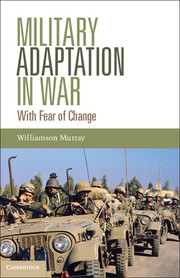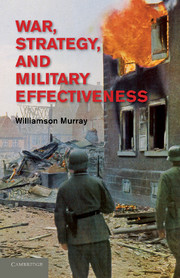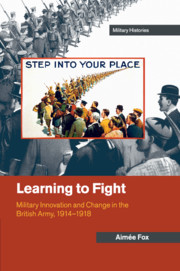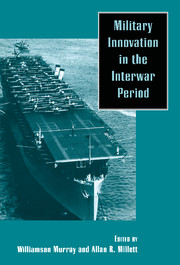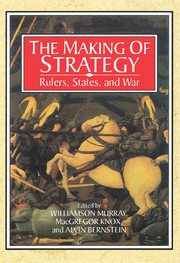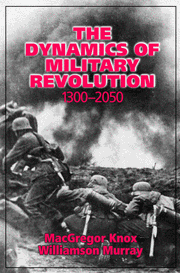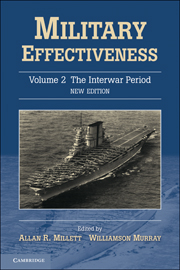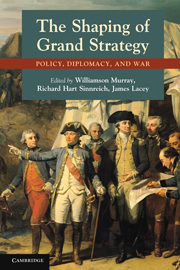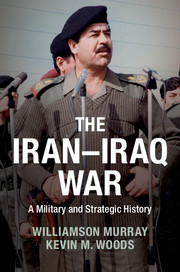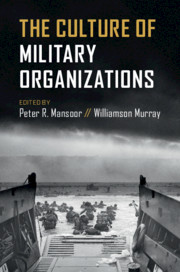Military Adaptation in War
With Fear of Change
- Author: Williamson Murray, Ohio State University
- Date Published: December 2011
- availability: Available
- format: Hardback
- isbn: 9781107006591
Hardback
Other available formats:
eBook
Looking for an inspection copy?
Please email [email protected] to enquire about an inspection copy of this book
-
Military Adaptation in War addresses one of the most persistent problems that military organizations confront: namely, the problem of how to adapt under the trying, terrifying conditions of war. This work builds on the volume that Professor Williamson Murray edited with Allan Millett on military innovation (a quite different issue, though similar in some respects). In Clausewitzian terms, war is a contest, an interactive duel, which is of indeterminate length and presents a series of intractable problems at every level, from policy and strategy down to the tactical. Moreover, the fact that the enemy is adapting at the same time presents military organizations with an ever-changing set of conundrums that offer up no easy solutions. As the British general, James Wolfe, suggested before Quebec: 'War is an option of difficulties'. Dr Murray provides an in-depth analysis of the problems that military forces confront in adapting to these difficulties.
Read more- An in-depth study of the problems that military forces confront in adapting to the ambiguous, uncertain and complex environment that is war
- Examines the importance of innovation in the distinctive contexts of a number of wars throughout history
- A crucial, yet rarely examined, military issue
Reviews & endorsements
' … [the author] has produced not only an excellent historical account of adaptation in twentieth-century warfare, but a forensic dissection of the common factors and approaches that can be applied to improve the chances of a military organization successfully adapting to future challenges. It is the best single-volume study of the subject yet written, and deserves a place on the bookshelf with Smith's The Utility of Force and Cohen and Gooch's Military Misfortunes: the Anatomy of Failure in War - and alongside Sun Tzu and Clausewitz.' Survival
See more reviews'… an important work for those interested in the events it covers, as well as for anyone concerned with how armed forces tick.' A. A. Nofi, www.strategypage.com
Customer reviews
17th Oct 2024 by UName-144117
The only constant in war is change, and Williamson Murray addresses this factor through the lens of five case studies ranging from the Great War to the Yom Kippur War. Murray has written extensively on the subject of military effectiveness, defining military change during periods of peace as innovation, and during war as adaption. His works are always thought provoking, and his analysis of why innovation and adaption is successful, or not, should be read by all military officers. Sadly, many officers are intellectually lazy, and Murray’s message reinforces this view that their failure to seriously study their profession in peace results in adaption during war at the cost of other people’s lives. Echoing Sir Michael Howard’s view that the military profession is the most difficult of all professions in terms of its physical and intellectual demands, and acknowledging military innovation and adaption is a complex problem, Murray addresses these matters in a thoughtful introduction that raises many issues relevant to today’s armies. This is followed by an historical survey of military adaption, demonstrating that the need to adapt in war has increased at a much faster pace since the early twentieth century, and will continue to do so. Noting that while one of the most serious impediments to military adaption is the bureaucracies that run them, it requires open mindedness and honest evaluations by the military itself if they are to adapt and innovate quickly, - but too often they have been more committed to the ethos of the past than preparing to meet the future. Many historians have accepted as a truism, that by studying the last war military institutions do badly in the next but, says Murray, it is precisely because they do not seriously study the last war that they have so often failed to adapt to the realities of the next one. Underpinning this, he argues, must be a serious professional military education as opposed to training, but far too often the military adopt the form, but not the substance in their staff and higher education colleges. The most disappointing case study is that of the complex adaptions undertaken during the Great War. Clearly this is not Murray’s field of expertise as he relies heavily on the works of others. Early in the chapter, he writes that “too few historians understand the nuts and bolts of what actually transpires on the tactical battlefield.” Yet in making his case, in this reviewer’s opinion, he quotes the work of some who fall precisely into that category. So rather than understanding the method and drivers of adaption, we are presented with an overview of the well known changes, and an overemphasis of the tired old criticism of the British, and Haig. It seems that Murray is not aware of the works of Stephen Badsey, Spencer Jones and others on the considerable tactical reforms undertaken by the British Army following the South African War, and into the Great War. He is on much firmer ground in the remainder of his case studies. Relying on his own research, the results are much more satisfying, and one gains a clear insight into the various factors that contribute to effective adaption, or not. Thus following the highly successful Polish Campaign, a readiness to evaluate their own performance honestly and openly, rather than being blinded by success, enabled the Wehrmacht to adapt rapidly to fix key problems in time for the equally successful French Campaign eight months later. Underpinning this was a prewar culture of a serious and intellectual professional military education. However, Murray warns, it was a narrow education that led to failure to adapt at the operational and strategic levels, resulting in defeat. Two studies of the air war over Europe demonstrate the pivotal part paid by an organisation’s leader in either achieving rapid adaption, in the case of Fighter Command, or not, in the case of Bomber Command and the Luftwaffe leading to the enormous losses they suffered. Both are extensive studies, in which the numerous adaptions on both sides are chronicled in detail, highlighting the key part played a few individuals who had the courage of their convictions, or, in the case of failure, a reluctance to accept change and pursue pre-conceived doctrine despite the data demonstrating its failure. More a fascinating and sobering narrative of the Israeli command failures, rather than a study in adaption, the chapter on the Yom Kippur War demonstrates that even highly effective militaries can draw wrong lessons from a previous war with only a cursory consideration of the issues. If anything, this chapter shows how lucky the Israelis were in winning, and that the IDF may not be the crack force portrayed in popular literature owing their success as much to a couple of Arab mistakes, as to a few aggressive leaders who overcame several Israeli mistakes. Overall, this is a worthwhile book, and the way in which effective organisations adapted makes interesting and informative reading. It is a book that current military leaders would do well to read. Murray hammers home the point, that only with a willingness to analyse one’s performance in battle with critical and honest appraisals, and a readiness to abandon previous doctrine and ideas when they don’t work, can military organisations effectively adapt during war. Yet to do so requires a sound professional education, and an ingrained culture of challenging past performance.
Review was not posted due to profanity
×Product details
- Date Published: December 2011
- format: Hardback
- isbn: 9781107006591
- length: 352 pages
- dimensions: 235 x 158 x 25 mm
- weight: 0.61kg
- availability: Available
Table of Contents
Preface
1. Introduction: the background to military adaptation
2. The historical framework of adaptation
3. Complex adaptation: the Western front 1914–1918
4. Flawed adaptation: German adaptation and the opening battles of World War II
5. The battle for the British Isles: June 1940–May 1941
6. Adaptation in the air war: RAF bomber command and Luftwaffe's air defenses (15 May 1940 to 7 May 1945)
7. The 1973 Yom Kippur War
8. Conclusion: adaptation and the future.
Sorry, this resource is locked
Please register or sign in to request access. If you are having problems accessing these resources please email [email protected]
Register Sign in» Proceed
You are now leaving the Cambridge University Press website. Your eBook purchase and download will be completed by our partner www.ebooks.com. Please see the permission section of the www.ebooks.com catalogue page for details of the print & copy limits on our eBooks.
Continue ×Are you sure you want to delete your account?
This cannot be undone.
Thank you for your feedback which will help us improve our service.
If you requested a response, we will make sure to get back to you shortly.
×
